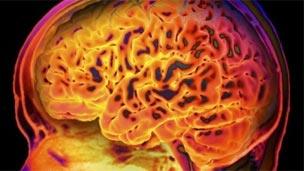New brain scan to diagnose autism
- Published

The computer scan shows up a distinctive pattern associated with autism
A brain scan that detects autism in adults could mean much more straightforward diagnosis of the condition, scientists say.
Experts at King's College London said the scan - tested on 40 people - identified tiny but crucial signs of autism, only detectable by computer.
Current methods of diagnosis can be lengthy and expensive.
But some experts say further research will be needed before the new technique can be widely used.
Autism Spectrum Disorder affects an estimated 1 in every 100 adults in the UK, most of them men. It varies from mild to very severe, and people with the condition can find the world appears chaotic and hard to understand.
Conventional diagnosis involves a team of experts who analyse behaviour and make a complex series of assessments.
The Medical Research Council study looked at 20 non-autistic adults and 20 adults with Autism Spectrum Disorder (ASD).
They were initially diagnosed using traditional methods, and then given a 15 minute brain MRI scan. The images were reconstructed into 3D and were fed into a computer, which looked for tiny but significant differences.
The researchers detected autism with over 90% accuracy, the Journal of Neuroscience reports.
"What the computer can do very quickly is to see that a patient has autism," said Professor Declan Murphy from the Institute of Psychiatry, who supervised the research, "even though their brain, to the naked eye, looks very normal."
Dr Christine Ecker, who led the study, said she hoped the findings might result in a widely available scan to test for autism.
"It could help to alleviate the need for the emotional, time consuming and expensive diagnostic process which ASD patients and families currently have to endure," she said.
Once a patient has a diagnosis, he or she is able to access help and support with managing the condition.
Visible confirmation
Joe Powell was diagnosed with Asperger's syndrome, a form of autism, 14 years ago. Before his diagnosis, he didn't speak at all.
Since then, he says he's made big progress in managing his condition.
His brain scan confirms his ASD. He says seeing his diagnosis charted in black and white made a big difference to him.
"You need to physically see it," he says.
"I know the autism is still there. The progress I've made in managing my condition is real, but it's still there."
The research team is now looking at whether the test would be effective on children.
Nicholas Joy describes what an Asperger's diagnosis meant for his health and treatment
The findings have been welcomed by the National Autistic Society, who say they add to the understanding of the condition. They say adults can find it very difficult to get a diagnosis of autism, and this may help.
However, they say without more awareness among doctors, it may be of limited use.
"There's still a woeful lack of awareness in GPs' knowledge of autism," said NAS centre director, Carol Povey.
"People with autism are often dismissed when they go to their GPs for help, so we have to make sure front-line professionals have awareness of autism so they can make appropriate referrals."
Professor Uta Frith from UCL Institute of Cognitive Neuroscience, said much more work would be needed before the scans could be used for diagnosis. "This study shows that the subtle brain abnormalities associated with autism show a distinctive pattern," she said. "It is crucial that we learn more about what the brain abnormalities mean."
- Published9 June 2010